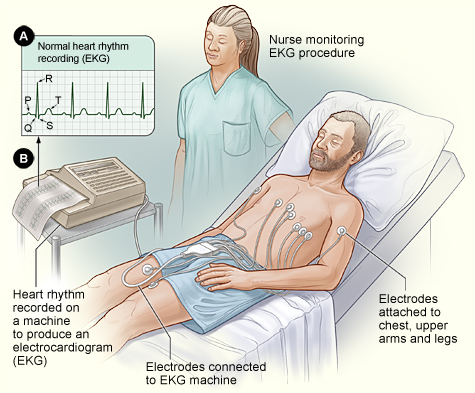What Is Long QT Syndrome?
Long QT syndrome (LQTS) is a disorder of the heart's electrical activity. It can cause sudden, uncontrollable, dangerous arrhythmias (ah-RITH-me-ahs) in response to exercise or stress. Arrhythmias are problems with the rate or rhythm of the heartbeat.
People who have LQTS also can have arrhythmias for no known reason. However, not everyone who has LQTS has dangerous heart rhythms. When they do occur, though, they can be fatal.
What Does "Long QT" Mean?
The term "long QT" refers to an abnormal pattern seen on an EKG (electrocardiogram). An EKG is a test that detects and records the heart's electrical activity.
With each heartbeat, an electrical signal spreads from the top of your heart to the bottom. As it travels, the signal causes the heart to contract and pump blood. An EKG records electrical signals as they move through your heart.
Data from the EKG are mapped on a graph so your doctor can study your heart's electrical activity. Each heartbeat is mapped as five distinct electrical waves: P, Q, R, S, and T.
EKG

The picture shows the standard setup for an EKG. Figure A shows the data from the EKG, which are mapped on a graph. In figure B, a patient lies in bed with EKG electrodes attached to his chest, upper arms, and legs. A nurse oversees the painless procedure.
The electrical activity that occurs between the Q and T waves is called the QT interval. This interval shows electrical activity in the heart's lower chambers, the ventricles (VEN-trih-kuls).
The timing of the heart's electrical activity is complex, and the body carefully controls it. Normally the QT interval is about a third of each heartbeat cycle. However, in people who have LQTS, the QT interval lasts longer than normal.
A long QT interval can upset the careful timing of the heartbeat and trigger dangerous heart rhythms.
For more information about the heart's electrical system, go to the Health Topics How the Heart Works article.
Overview
On the surface of each heart muscle cell are tiny pores called ion channels. Ion channels open and close to let electrically charged sodium, calcium, and potassium atoms (ions) flow into and out of each cell. This generates the heart's electrical activity.
In people who have LQTS, the ion channels may not work well, or there may be too few of them. This may disrupt electrical activity in the heart's ventricles and cause dangerous arrhythmias.
LQTS often is inherited, which means you're born with the condition and have it your whole life. There are seven known types of inherited LQTS. The most common ones are LQTS 1, 2, and 3.
In LQTS 1, emotional stress or exercise (especially swimming) can trigger arrhythmias. In LQTS 2, extreme emotions, such as surprise, can trigger arrhythmias. In LQTS 3, a slow heart rate during sleep can trigger arrhythmias.
You also can acquire LQTS. This means you aren't born with the disorder, but you develop it during your lifetime. Some medicines and conditions can cause acquired LQTS. (For more information, go to "What Causes Long QT Syndrome?")
Outlook
More than half of the people who have untreated, inherited types of LQTS die within 10 years. However, lifestyle changes and medicines can help people who have LQTS prevent complications and live longer.
Some of these lifestyle changes and treatments include:
- Avoiding strenuous physical activity or startling noises.
- Adding more potassium to your diet (as your doctor advises).
- Taking heart medicines called beta blockers. These medicines help prevent sudden cardiac arrest.
- Having an implanted medical device, such as a pacemaker or implantable cardioverter defibrillator. These devices help control abnormal heart rhythms.
If you have LQTS, talk with your doctor about which lifestyle changes and treatments are best for you.
Clinical trials are research studies that explore whether a medical strategy, treatment, or device is safe and effective for humans. To find clinical trials that are currently underway for Long QT Syndrome, visit www.clinicaltrials.gov.
The NHLBI updates Health Topics articles on a biennial cycle based on a thorough review of research findings and new literature. The articles also are updated as needed if important new research is published. The date on each Health Topics article reflects when the content was originally posted or last revised.















